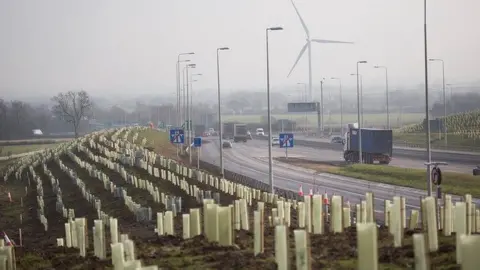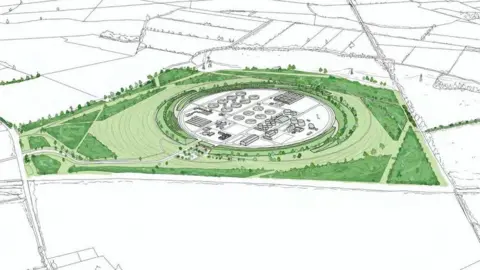Cambridge Waste Water Treatment Plant: Anglian Water vows 'no repeat' of tree deaths
 National Highways
National HighwaysThere will not be a repeat of the A14 tree deaths at the proposed Cambridge sewage works, Anglian Water has said.
Concerns were raised that plans to plant trees on top of an embankment at the site near Horningsea would not survive without long-term watering.
The water company said the plans would be a "very different situation" to one which saw many of the 860,000 trees planted by National Highways die.
If approved, the existing sewage works north of Cambridge would be replaced.
Anglian Water submitted a Development Consent Order (DCO) application to request permission to build the new Cambridge Waste Water Treatment Plant on land north of the A14, known as Honey Hill.
The project has come forward to free up the land the existing plant sits on to be redeveloped into around 8,000 homes as part of the North East Cambridge development.
 Anglian Water
Anglian WaterAt a DCO hearing last week, planning examiners highlighted concerns that had been raised about the proposals.
Many trees died soon after they were planted alongside the nearby 12-mile (19km) section of the A14 in Cambridgeshire in 2020 - with dry weather conditions blamed.
Alex Hudson, one of the examiners, said: "Numerous concerns around the likely success of planting on the bund have been raised, primarily due to the dryness area and the potential need for watering in perpetuity. If constant watering is needed, how does this represent a sustainable design solution?"
Jo Morrison, representing Anglian Water, said detailed plans had been prepared for the tree planting and to look after them as they establish.
She said they planned to make sure the soil was of good enough quality to make a "good growing medium" on the embankment.
Ms Morrison added that if any trees did die, then they would be replaced, potentially with a species more likely to survive.
However, Ian Gilder, from the Save Honey Hill campaign group, said he had been planting trees in the area for 30 years and said he had seen the impact of drier seasons.
He said: "I think it is pretty clear that without sustained watering, or opportunity to intervene in dry conditions that it is very unlikely that those trees will thrive."

Find BBC News: East of England on Facebook, Instagram and Twitter. If you have a story suggestion email [email protected]
